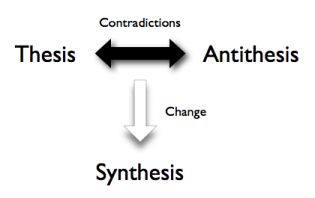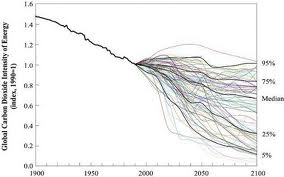
I’m not saying that Pearson has even read Mao. I wouldn’t know. I suspect he hasn’t because he has invented his own terminology, which is different from classical marxist terminology. This is not unusual. Dialectics has been discovered and rediscovered many times in parallel fashion. eg. quite a few scientists employ some sort of dialectical method.
Mao’s explanation of dialectics is the clearest that I’m aware of. Partly because of that I see it as a useful exercise to outline the connection between Pearson’s philosophy and Mao’s. The fact that Pearson has invented his own independent terminology – and in all likelihood has come to his philosophy by a different pathway – makes the comparison all the more interesting. “Great minds think alike” – or something like that.
Most of the quotations below come from the following two essays:
White guilt, victimhood and the quest for a radical centre by Noel Pearson (2007)
On Contradiction by Mao Zedong (1937)
Dialectics as the way in which things develop
Mao:
The fundamental cause of the development of a thing is not external but internal; it lies in the contradictoriness within the thing
Qualitatively different contradictions can only be resolved by qualitatively different methods
This dialectical world outlook teaches us primarily how to observe and analyse the movement of opposites in different things and, on the basis of such analysis, to indicate the methods for resolving contradictions
Pearson:
My contentions are these. First, it is important to correctly identify the fundamental dialectical tensions that define human policy and political struggle. Second, the resolution of each of these tensions lies in their dialectical synthesis, and not through the absolute triumph of one side of a struggle or a weak compromise. Third, other subsidiary struggles fall out of these classical conflicts. Fourth, complexity arises because questions of human policy are not confined to the neat and isolated categories of a ten‐point list. Rather, they involve a number of tensions simultaneously
Importance of all sided, concrete analysis and the identification of the principal contradiction
Mao:
Lenin … said that the most essential thing in Marxism, the living soul of Marxism, is the concrete analysis of concrete conditions … Without concrete analysis there can be no knowledge of the particularity of any contradiction
Lenin said:
“… in order really to know an object we must embrace, study, all its sides, all connections and “mediations”. We shall never achieve this completely, but the demand for all-sidedness is a safeguard against mistakes and rigidity”
There are many contradictions in the process of development of a complex thing, and one of them is necessarily the principal contradiction whose existence and development determine or influence the existence and development of the other contradictions … in studying any complex process in which there are two or more contradictions, we must devote every effort to finding its principal contradiction
Pearson:
Aboriginal people are faced with a wide variety of problems – substance abuse, dependency on passive welfare, racism, dispossession and trauma.
Out of this variety of issues Pearson identifies the main problems of the aboriginal people as substance abuse and dependency on passive welfare
He doesn’t reject or dismiss the importance other problems (racism, dispossession and trauma) but he does distinguish clearly between the current main problems and the longer term historical legacy, putting these latter problems in a secondary position for now.
“When abusive behaviour is deeply entrenched in our communities it is not the material destitution , the social ills and historical legacy that fuel the abuse epidemics. It is the epidemics that perpetuate themselves.”
On the human right to misery, mass incarceration and early death (October 2001).
This analysis gives hope and real guidance because it means aboriginal and white people can get on with tackling real and urgent issues rather than becoming passive (paralysed by the complexity) and possibly guilty about a huge morass of unresolved issues. Pearson rejects “symptom theory thinking”, that the main reason for substance abuse is the despair, hopelessness, social dislocation of aboriginal communities and other “underlying causes”. He identifies such thinking as a real problem, causing paralysis.
Identity of opposites (Mao); pyramid and radical centre (Pearson)
Mao’s identity of opposites:
Lenin said:
“Dialectics is the teaching which shows how opposites can be and how they happen to be (how they become) identical–under what conditions they are identical, transforming themselves into one another,–why the human mind should take these opposites not as dead, rigid, but as living, conditional, mobile, transforming themselves into one another”
It is only the reactionary ruling classes of the past and present and the metaphysicians in their service who regard opposites not as living, conditional, mobile and transforming themselves into one another, but as dead and rigid, and they propagate this fallacy everywhere to delude the masses of the people, thus seeking to perpetuate their rule
Pearson’s pyramid and radical centre metaphors:
We are prisoners of our metaphors: by thinking of realism/pragmatism and idealism as opposite ends of a two‐dimensional plane, we see leaders inclining to one side or the other. The naïve and indignant yaw towards ideals and get nowhere, but their souls remain pure. The cold‐eyed and impatient pride themselves in their lack of romance and emotional foolishness: pragmatism and a remorseless Kissinger‐esque grasp of power make winning and survival the main prize every time. Those who harbour ideals but who need to work within the parameters of real power (as opposed to simply cloaking lazy capitulation under the easy mantle of righteous impotence) end up splitting the difference somewhere between ideals and reality. This is called compromise. And it is all too often of a low denominator.
I prefer a pyramid metaphor of leadership, with one side being realism and the other idealism, and the quality of leadership dependent on how closely the two sides are brought together. The apex of leadership is the point where the two sides meet. The highest ideals in the affairs of humans on Earth are realised when leadership strives to secure them through close attention to reality. Lofty idealism without pragmatism is worthless. What is pragmatism without ideals? At best it is management, but not leadership …
Idealism and realism in leadership do not constitute a zero‐sum game. This is not about securing a false compromise. It need not be a simple trade‐off where one splits the difference. The best leadership occurs at the point of highest tension between ideals and reality. This is the radical centre. If the idealism is weaker than the realism, then optimum leadership cannot be achieved. And vice versa. The radical centre is achieved when both are strong
Development is uneven, equilibrium is always temporary
Mao:
In any contradiction the development of the contradictory aspects is uneven. Sometimes they seem to be in equilibrium, which is however only temporary and relative, while unevenness is basic. Of the two contradictory aspects, one must be principal and the other secondary. The principal aspect is the one playing the leading role in the contradiction. The nature of a thing is determined mainly by the principal aspect of a contradiction, the aspect which has gained the dominant position…. Nothing in this world develops absolutely evenly; we must oppose the theory of even development or the theory of equilibrium
Pearson:
“… it is difficult for the same actor to play several roles in the dialectical process. It is possible for the same person to have an overall intellectual analysis, but practical politics and the production of theory are not the same thing. For example, in a socially and economically successful country, there is competition between interests and forces which represent capitalist principles on the one hand, organisations which represent communal and socialist ideas on the other, and inspired political leaders who perform the synthesis between these contradictions. It is possible for an individual to have an intellectual appreciation of this, but that individual can hardly play all three roles …
I will finish by setting out some reflections on my experience of driving an agenda of rights and responsibilities in Indigenous policy. By the end of the last millennium, it was not possible to continue in this area without facing up to the gaping responsibility deficit. It was a deficit of which I had long been aware, but the prevailing currents were averse to this particular R word. Two other Rs – rights and reconciliation – were ruling. I have never doubted the correctness of our claim to rights; I have made a contribution to the struggle for the rights of my people in Cape York Peninsula, and have continued this contribution. Our rights to our traditional lands, to our languages and our cultures, our identities and traditions are a constant part of our work for a better future for our people.
When I decided that we could no longer go on without saying that our people held responsibilities as well as rights, is was not a repudiation of rights. It was just that all of the talk, all the advocacy, all the analysis, all the leadership, and all the policy and politics was about rights. There was no talk about responsibility. So when we talked about child malnutrition, we spoke of the rights of the children and the responsibility of governments, but we didn’t talk about the responsibilities of parents. We didn’t ask “how come children are malnourished?” It can’t be because the parents have no money, because in Australia the government provides money to all those who don’t have an income. It can’t be because there is no food available – there are shops in these communities where the malnourished children live, as well as bush food.
There was a widespread refusal to even think about responsibility. If there were no practical consequences to our failure to talk about responsibility – and strong strategic reasons not to make the responsibility concession to the political right – then this situation could have continued. But there are practical consequences galore! It is simply not possible to see how any social or economic problem can be solved, or opportunity seized, if we don’t first accept responsibility. No progress can be made without filling the gaping deficit.
My view is that the main reason why people have refused (and still refuse) to talk about responsibility is not for strong strategic reasons, but because they actually believe that better health and better education and better housing and better life expectancy and better survival of traditional languages are rights that can be enjoyed if other people – specifically governments, but also the wider society – take the necessary actions to make them materialise. It amounts to this absurdity: my rights depend on you fulfilling your responsibilities to me. Who in world history has ever been saved by anyone in the way we hope whitefellas will save our people?”
Any thoughts about these and / or other principles of dialectical philosophy and how they can or should be applied to the current local or world situation? eg. What is the principal contradiction in the world today?











Recent Comments